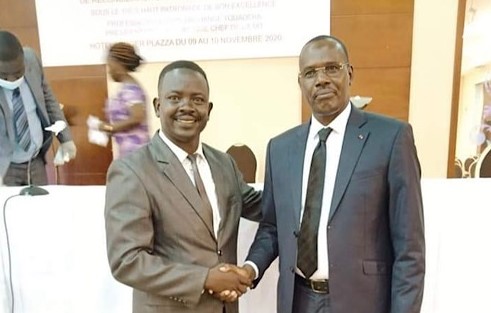Two Prisoners Of War Released As CAR Rebel Groups Sign Reconciliation Accord

Two prisoners of war (POW) identified as being of Sudanese nationality have been released by the Central African Republic authorities following the signing of a reconciliation accord on Tuesday, November 10 between different communities in the north of the country.
The signing of the reconciliation accord follows two days of talks between various armed groups and communities in the north of the country, convened by head of state Faustin Archange Touadera.
Official sources told HumAngle in Bangui qualified the talks as a total success while some participants at the talks said the various communities represented at the talks were far from reconciling among themselves because most of the demands of the different groups were not met.
Prime Minister Firmin Ngrebada presided over the official closing ceremony of the talks which took place at 21 hours in the presence of some members of the government as well as rebel leader Ali Darrassa of the Unite pour la Paix en Centrafrique UPC, former minister Abdoulaye Hissen of the Popular Front for the Rebirth of Central Africa popularly known by its French abbreviation FPRC, Gilbert Toumou Ndeya, Minister Counsellor to the Prime Minister as well as the Sultan of Ndele, Ibrahim Sanoussi and the Sultan of Birao, Ahamat Moustapha Am-Gabo.
The talks were marked by tension throughout their duration with members of various delegations picking up quarrels with members of rival groups.
At one point, members of the delegation representing the Kara who are natives of Birao and who comprise the majority of the Movement of Central African Liberators for Justice (MLCJ) called for the expulsion of the Sarra and Haoussas from Birao before they would sign any reconciliation agreement.
On the other hand, representatives of the Rounga community supported by the Sarra, Arab and Haoussas demanded that the village of Ndah, situated 80 kilometres from Birao on the Ndele highway which is occupied by MLCJ combatants be officially handed over to them.
They also demanded that all their properties destroyed in Birao be paid for. They finally demanded the release of FPRC combatants detained in the Ngaragba central prison within the 7th subdivision of Bangui.
Against all expectations, no meeting was organized between the two main rival communities represented at the talks namely, the Kara and Goula on the one hand and the Rounga, Sarra, Haoussa and Arab on the other hand.
Surprisingly, after several hours of disagreement, the government presented a draft reconciliation agreement for signature which did not mention any of the demands both sides made as preconditions for the signing of any agreement.
According to the organisers of the forum, it was not meant for the presentation of demands but rather for reconciliation between the northern populations of the country.
With this explanation, the two sides were left with no option than to sign the reconciliation agreement even after their representatives had stopped talking to each other.
Some observers of the forum have been quick to say the “reconciliation agreement” was a misnomer and should have been dubbed an “agreement to disagree”.
Support Our Journalism
There are millions of ordinary people affected by conflict in Africa whose stories are missing in the mainstream media. HumAngle is determined to tell those challenging and under-reported stories, hoping that the people impacted by these conflicts will find the safety and security they deserve.
To ensure that we continue to provide public service coverage, we have a small favour to ask you. We want you to be part of our journalistic endeavour by contributing a token to us.
Your donation will further promote a robust, free, and independent media.
Donate HereStay Closer To The Stories That Matter




